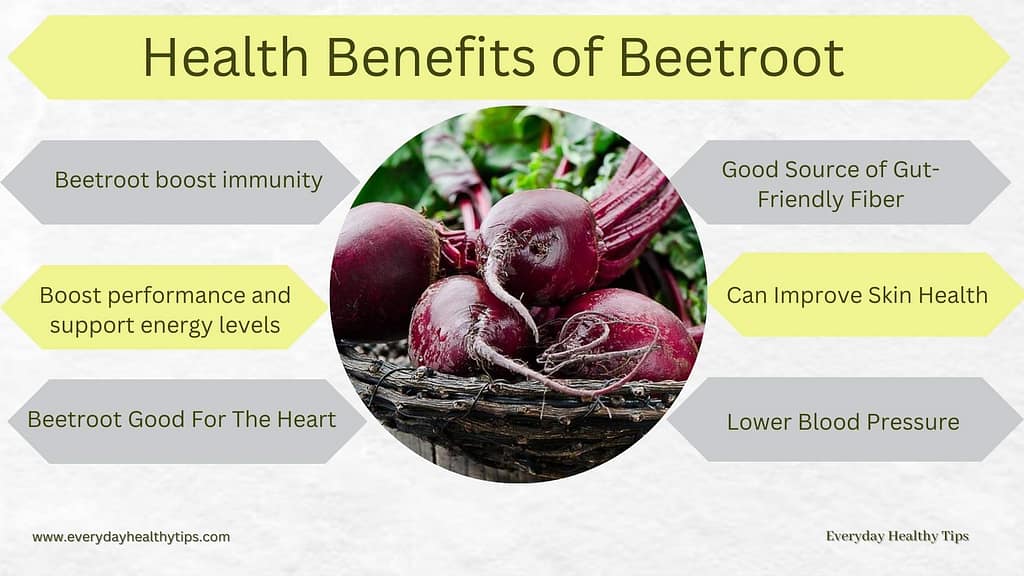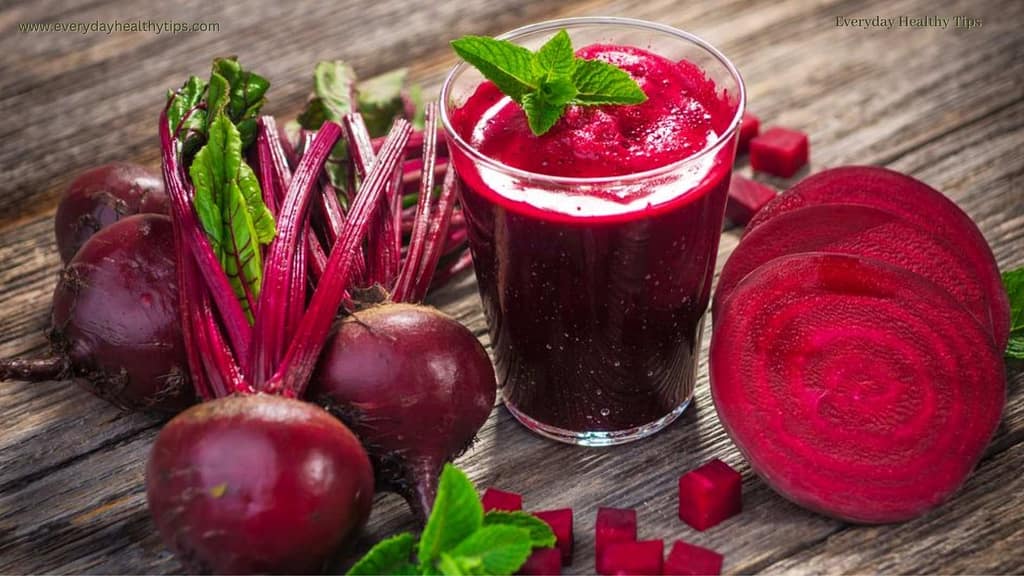Oh, the humble beetroot! Beets in North America, table, garden, red, dinner, or golden beets in British English. This taproot portion of the beet plant is truly a gift from the Earth!
Beetroot is a nutritional powerhouse that is garnering attention for its noteworthy health benefits. We can juice it, roast it, or eat it raw, and our bodies will get a lot of vitamins, minerals, and antioxidants from this beautiful red vegetable.
In this blog post, we will explore the powerful health benefits of beetroot and how to incorporate this root vegetable into your diet for maximum benefit.
What is Beetroot
The beet (Beta vulgaris) is a root vegetable that typically grows in a round bulb-like shape with a leafy top protruding from the soil. Although similar in shape to turnip and the radish, they are not botanically related.
The prehistoric root vegetable that tantalizes the taste buds of many has an intriguing history, originating from the sun-drenched coastlines of North Africa, Europe, and Asia. But over the centuries, this mysterious vegetable has become a global success story, with its popularity reaching far and wide.
Beetroot Nutrition Facts
A single cup of raw red beetroot (136g) has the following nutrition profile.
58 calories, 2.2g of protein, 13g of carbohydrates, and 0.2g of fat.
- Calories: 58
- Total Fat: 0.2g
- Sodium: 106mg
- Total Carbohydrate: 13g
- Dietary Fiber: 3.8g
- Sugar: 9.2g
- Protein: 2.2g
- Calcium: 21.76mg
- Iron: 1.09mg
- Potassium: 442mg
Health benefits of Beetroot
Boost immunity
Beets are a great source of dietary fiber, which can help to promote the growth of beneficial bacteria in the gastrointestinal tract. This increased microbial diversity can help fortify the immune system and protect against certain diseases.
According to the University of Maryland Medical Center, manganese is needed to synthesize superoxide dismutase. This is an antioxidant that neutralizes free radical molecules to protect against chronic diseases, including cancer and heart disease.
The US Department of Agriculture (USDA) reports that consuming one cup of raw beets provides 0.5 milligrams of manganese, which is 25% of the recommended daily value of this trace mineral.
Good For The Heart
Beets are an incredible source of folate (vitamin B9), making them a very beneficial food option for health. Folate reduces cardiovascular disease risk through controlling blood vessel damage.
According to a new study published in the Journal of Chiropractic Medicine, combining betaine and folate may help lower levels of homocysteine, a necessary amino acid for protein synthesis.
The folate in beets helps cells to grow and function properly, and has been linked to improved cognitive health in adults. It helps reduce inflammation, which can cause many different health issues. Beets are also rich in other nutrients, like potassium, magnesium, vitamin C, and fiber, all of which help to support overall health.
Boost performance and support energy levels
Beetroot and its juice contain nitric oxide, which can facilitate increased blood flow to muscles during physical activity, thereby improving heart and lung functioning.
Recent research has shown that dietary nitrates found in foods like beets may have a beneficial effect on physical performance, particularly when it comes to exercise endurance.
This new understanding of dietary nitrates has led to the emergence of “beetroot juice” as a popular supplement among athletes. It’s important to know that blood nitrate levels are highest two to three hours after eating or drinking beets or beet juice. For the most effective results, it is recommended that beets be eaten approximately two hours prior to engaging in physical activity or competing.

Lower Blood Pressure
Rich in nitrates, Beets are the perfect ingredient to help your body produce nitric oxide, a compound that widens and relaxes your blood vessels so that nutrient- and oxygen-rich blood can travel to your organs more easily.
High blood pressure can have a detrimental effect on your heart and blood vessels. In fact, it is one of the leading causes of heart disease, stroke, and death in many countries across the globe.
Recent studies suggest that drinking beetroot juice may have a beneficial effect on blood pressure, with evidence indicating that it can significantly reduce both systolic and diastolic blood pressure levels.
Good Source of Gut-Friendly Fiber
Working beets into your diet is a great way to boost your fiber intake. Fiber is essential for a healthy digestive system, as it helps to keep the body regular and can reduce the risk of constipation. Just one cup of beetroot contains 3.8 grams of fiber, which is roughly 16% of the recommended daily intake for adults.
According to a review published in May 2021 in Nutrients, increasing dietary fiber intake can help to promote the growth of beneficial bacteria in the gut.
Beets have been found to improve the gut microbiome. This is very important for reducing inflammation, keeping the immune system healthy, balancing moods, keeping cholesterol levels in check, and keeping blood sugar stable.
Can Improve Skin Health
Beetroot has become a popular ingredient in many skin care products due to its beneficial properties. Low in calories beetroot contains compounds such as carotenoids and Vitamin A which can help reduce and delay the signs of aging. While providing hydration and maintaining the health of the skin.
According to research, topical and dietary vitamin C (derived from beetroot) may be effective in reducing UV damage and wrinkling, promoting wound healing, and enhancing collagen formation.
Additionally, the antioxidants in beetroot can help to brighten your skin, making it an ideal choice for people with oily skin and acne. Beetroot has also been used as a natural bleaching agent. When added to lip balms, it can give the lips a slight tint and keep them moist.
Storage and Food Safety
Beets are a type of root crop which decomposes at a significantly slower rate than other water-rich produce, such as squash and radishes.
Store beets on a countertop or pantry : When preparing beets, first separate the greens from the root. The greens can be saved for cooking purposes. It is important not to wash the beets before storing as this will remove some of their outer skin and the dirt which serves to keep them fresh.
To ensure the quality of your beets, store them in a cool, dry location such as a countertop or pantry – temperatures should not exceed 70 degrees Fahrenheit. Beets may be stored in the open or placed into a bag with the air squeezed out.
Store beets in refrigerator : When preparing to store beets, cut off the greens approximately one inch above the root. It is important not to rinse them prior to putting them away as this will cause them to break down more quickly. Place the beets in a bag or container that is suited for refrigerated storage and remove any excess air from the bag.
The optimal storage space for the beets is in the crisper drawer of your refrigerator. When ready to use them, take out the beets as needed and be sure to regularly check for any that have spoiled.
Store beets in Freezer : In order to preserve the nutrients and flavor of beets, blanching is recommended. Cut the beets into slices or cubes and submerge them in boiling water for 2-3 minutes. Then, place them in a bowl of ice water for two minutes at a time. After removing them from the ice water, use a paper towel to pat them dry.
This is to ensure that the beets are free of any excess moisture before they are stored in the freezer. Put them in freezer bags or an airtight, freezer-safe container. Make sure to push the air out of the bag before sealing it. With proper storage, the beets can be kept in the freezer for up to 3-6 months.
Beetroot Side Effects
Your urine and stools may turn red or pinkish after eating beets. This harmless condition is known as beeturia and is caused by betalain pigments that are found in beets.
Beeturia is more likely to occur in people with iron deficiency, or those who have difficulty digesting and absorbing iron. It may be startling if you don’t expect it, however there are no negative effects associated with it.
Nitrates are high in beets, so drinking beet juice regularly could make your blood pressure drop too low. Therefore, if you drink beet juice regularly, it is important to monitor your blood pressure carefully so that it does not become too low.


